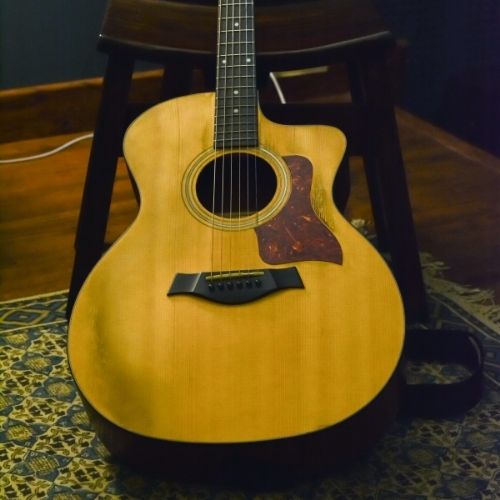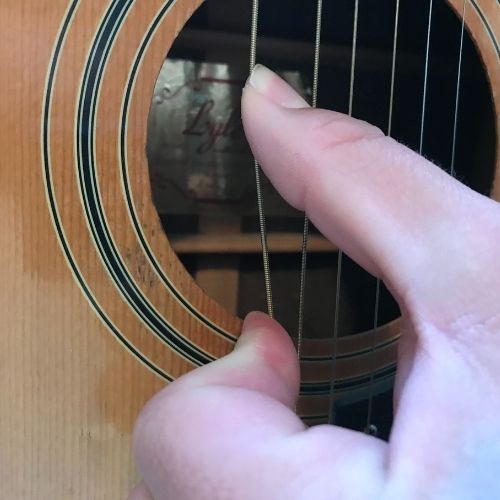We may get commissions for purchases made through links in this post. Thanks for the support! 👍
There is a lot of debate among musicians about whether lighter strings make it easier to play. Some people swear by them, while others think they make no difference at all. I wanted to take a look at this topic from a musician’s perspective and see if there is any truth to the claim that lighter strings are easier to play. Stay tuned for my thoughts on this subject!
I use lighter strings on all of my guitars, this is because I am primarily a hobbyist guitarist, and I am not too worried about the downsides of lighter strings (we’ll talk about that in a bit). Instead, the upsides of easier playability due to them taking less effort to push down, and of course to bend and change the sound wins out for me.
Let’s talk a little bit more about each of these things, and maybe figure out if lighter strings are right for you.
You don’t need to push down as hard
Because lighter guitar strings are thinner, have less tension, and are just more malleable in general, it makes it considerably easier to push these strings down against the frets of your guitar. This is by far the main reason that I like having lighter guitar strings on all of my guitars.
When you are a hobby guitarist and not a professional guitarist that plays gigs, you want to fully enjoy playing guitar when you have a chance to sit down and play.
With the lighter strings (like these ones), it is much easier to sit down, doodle around a little bit and move on. While heavier strings tend to be more difficult to play.
This is another great reason why light strings are great for beginners! Although lighter strings are thinner, meaning beginners without calluses may find them cutting into their fingers earlier in the playing experience than with thicker strings.
One other note on this: Lighter strings are so much easier to use when playing bar chords. If you are someone that plays a lot of bar chords, you might want to consider these types of strings.
Thinner strings are easier to bend
If you are someone that likes to bend their strings to adjust the tone of the music, then lighter strings are a great option. Because each string has less tension, it will be easier for you to bend the strings without having to use as much force.
If you have ever played the guitar with heavy strings, you know that it can be difficult to
bend them without putting a lot of strain on your fingers. This is because the strings are under more tension and require more force to bend.

Why would they be harder to play?
Thinner strings hurt your fingers more
Lighter strings are thinner, which can cause them to cut into your fingers more easily if you don’t have calluses. While beginners or people getting back into playing guitar will be well suited to lighter strings because they are easier to press down, you may find that you have shorter practice sessions due to your fingers starting to hurt from the thinner strings.
While I find that the trade-off here is well worth it as you build up the calluses, some may not like the hurting it causes.
Why would you not want to use lighter strings?
Lighter strings are tinnier, and have less bass
The sound that you get out of lighter strings is going to be tinnier and have less bass than the heavier strings. This is because the strings are thinner and have less tension on them.
If you are looking for a guitar that has a really rich sound, you may want to shy away from lighter strings as they will not give you the same sound.
They tend to buzz more
Lighter strings like these are more pliable, which also means that when played, they also vibrate more. This can cause the strings to buzz considerably more than heavier strings.
The strings vibrate, and cause the strings to hit the frets, which results in a buzzing sound when you find yourself strumming harder.
This can be extremely annoying, especially if you are playing in front of people. However, if you are just playing around at home, this isn’t a huge deal.
They break more often
This, of course, comes with the territory of the thinner metal that lighter strings are made of. Over time, thinner strings are going to become damaged, and have a higher chance of snapping. You might find yourself spending more over time, as you have to replace your strings more often, than if you purchased thicker gauge strings.
Are lighter strings right for you?
Even though there are quite a few downsides to lighter strings on a guitar, I find myself exclusively purchasing lighter strings for my guitars. The ease of playability as a hobbyist guitarist makes all of the difference to someone like me.
If you are a beginner, play a lot of bar chords, or are just a hobbyist guitarist that plays at home on your own, then lighter strings are going to be an awesome option.
If you are an intermediate or above guitarist that plays a lot in front of people, plus have built up your hand strength and calluses, then a heavier gauge string might be your best bet.
What does gauge mean with guitar strings?
If you’ve ever gone to buy a new set of guitar strings, you might have noticed that they come in a variety of gauges. But what does gauge mean? In the most basic sense, gauge refers to the thickness of the string.
A thicker string will have a higher gauge, while a thinner string will have a lower gauge. The type of gauge you need will depend on a few factors, including the style of music you’re playing and the size of your guitar.
Generally speaking, thicker strings are better for heavier styles of music, while thinner strings are better for lighter styles of music. However, it’s ultimately up to you to experiment with different gauges to find the sound that you’re looking for. So don’t be afraid to mix things up and try out some new gauges on your next set of strings.
Conclusion
In the end, it comes down to personal preference. Do you want strings that are easier to play, but might have a shorter lifespan? Or strings that are a little tougher on your fingers, but will give you a richer sound?



